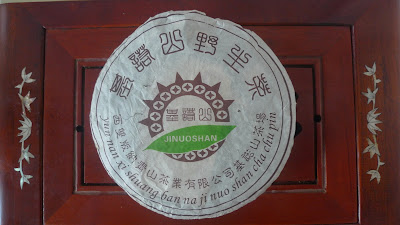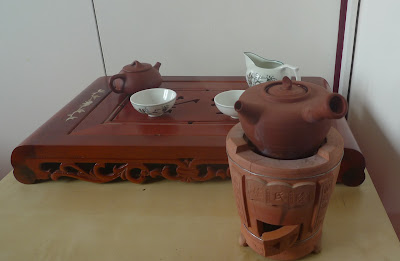This exact tea is not easy to get (I managed to get it only because of a friend), another Jinuo You Le 2004 cake can be bought from Yunnan Sourcing (which has 357g); the 400g cake is less tightly pressed and stored in drier conditions. I feel it has more complex taste than the 357g cake, but the 357g cake is a very good tea too.
However, beware of autumn 2004 Jinuo You Le. It is obviously You Le tea, but it is much, much worse.
Let's see some pictures to get started:
The wrapped cake:
The cake unwrapped:
Dry leaves (7g); lovely, honey-fruit-spicy aroma:
A comparation of 2004 spring material (the left sample) and 2004 autumn material (the right sample - beware of it). The autumn cake is darker, very lightly pressed and almost unnaturaly dry.
Today, I prepared the tea with fish-eyed water, 90°C. It can be brewed with warmer water (more spicy, more intense hui gan, the energy (cha qi?) is wilder), as well as with colder water (more honey-like, gentler, the energy is soothing and calming). I feel that both approaches are very interesting and worthwile. The temperature chosen today is a compromise - one can feel both.
I used Brita-filtered water, boiled in Chao Zhou tea stove.
The amount of leaves used was 7 grams (I usually do not know it exactly, but since this tasting should be reproducible, I measured it rather exactly).
After rinsing the tea...
- 1st brew: 10s (We have rinsed it, and it is not too heavily compressed, so it is not that short):
- Rather light-colored broth, very clear, rather thick (I have drank thicker teas, mostly from Yi Wu, but this is definitely above average). Let us note that a part of the thickness is caused by the water being boiled in the tea stove (I have no idea why, but I like it).
- The aroma reminds me of hot summer meadows with all the flowers around, bees buzzing etc. There is also something "darker", sweeter in the taste (I think that this is the blackberry tone which appears in further brews).
- The taste is very warm and soothing, nothing disturbing is present (which is quite rare for a tea of this age). There are tones of fruit (peaches), meadow flowers and meadow honey.
- The aftertaste is long and very warm, with just a hint of astringency, which transforms into sweetness (this astringency is not present at all when the tea is brewed with colder water).
- 2nd brew: 10s
- The tea broth is darker, still crystal clear (in sunny weather, nice colorful sparks show up)
- The aroma is very complex, definitely heavier than in the first brew: deeply sweet (still not unpleasantly heavy), still having a certain meadow-like lightness to it.
- The taste corresponds to the aroma. It is very complex too, a little less sweet, a little mory spicy and fruity (peaches, a bit of pineapple).
- The aftertaste is very long and intense, it has nice hui gan (If I had to pick a negative, albeit a small one, I'd say the transformation to sweetness could be a little bit faster). The tea energy is more powerful as it resonates in my body.
- 3rd brew: 10s
- The broth is, again, thick, clear and lovely-colored.
- The aroma is a bit lighter-toned than in the 2nd brew (but heavier than in the 1st brew), more meadow-like.
- The taste is not so complex as in the 2nd brew (we'd have to prolong the length of this brewing), peaches are dominant fruit, but blackberry tones appear too. The taste of honey is still present and complements the fruity tones nicely. The main body of the taste could be a bit longer though.
- The aftertaste is more fruity than in the previous brew, the transformation of slight astringency to powerful sweetness (not a bad tradeoff - a bit of astringency for a lot of sweetness, another positive of this tea) is now fast enough and very satysfying.
- 4th brew: 15s
- The color is similar to the one of previous brews. Since I quite enjoy it, I have no problem with it.
- The aroma is less powerful than in the previous brews, very meadow-like. Something like "aftersmell" is more fruity.
- The taste is great, balanced, has almost everything this tea has to offer - meadow flowers, peaches, honey, a bit of pineapple at the beginning, a bit of blackberries at the end. The main body of the taste is long enough.
- The aftertaste is very long, again rather fruity, with powerful hui gan. The tea energy seems calmer now, not so wild as in the 2nd brew.
- 5th brew: 20s
- The aroma and color is quite similar to the of the previous brew.
- The taste is less complex, the taste of peaches is less dominant, on the other hand, spicy tones start to show up again.
- The aftertaste is long, less fruity (more spicy instead), good hui gan.
- 6th brew: 25s
- The color is lighter, still nice.
- The aroma is light, flowery and spicy.
- The taste is not as complex as in the previous brews. It is not so warm and soothing, it is more spicy and wood-like.
- The aftertaste is, at the beginning, not so great as in previous brews, but the hui gan is very powerful (probably the best part of this brew).
- 7th brew: 60s
- The tea broth is darker (as we brewed it for a longer time), clear.
- The aroma is complex, spicy and wood-like
- The taste is more masculine, still elegant though. Fruity tones are almost missing, so we get flowers with a bit of honey and a lot of spice and wood. The body of the taste is not so full, still very entertaining.
- I felt the hui gan was so good I ceased to drink at this moment to fully enjoy it...I felt the sweetness for another hour. More brews could be prepared though, the tea was still not empty.
A picture of the wet leaves:
Summary:
I think this tea is great. Not only because it is great, but because it is not that expensive either (Those YS Jinuos are very well priced, in my opinion, very nice teas too).
It is surprisingly mellow and mature for its age - I consider it to be very drinkable now. More aging may change it, of course, but I felt no flaws of youth already.
I like this tea, as there is nothing unpleasant it - it's sweet, complex, interesting, having nice hui gan... I can only recommend it
One last note: if you have a chance to buy it, I recommend buying a sample first, a friend of mine bought some "great spring Jinuo", but it turned up to be the bad autumn Jinuo... there are better ways of spending money. Plus, the factory's production does not seem too orderly to me - sometimes, the same tea is in different packagings, sometimes, different teas are in the same packaging...ugh. Gets confusing easily :-)













A good review! Especially your remarks about different water temperature are interesting to me, especially since I have the same tea (the smaller YS version).
OdpovědětVymazatSo what would you consider "colder water"? At very small bubbles (I assume you do not measure temperature)?
Also, may I ask where you got this wonderful stove from? How much water does the kettle hold?
Martin
Hi,
OdpovědětVymazatthanks!
Indeed, since I lost my thermometer somewhere, I usually just guess the temperature. I think that very small bubbles are the lowest temperature I'd use I think - the tea is very light, lovely, not too deep though. As the temperature rises, darker tones show up too.
The tea stove is from Teahabitat: http://teahabitat.com/
However, I don't know if they still have it.
Have a nice day!
Jakub
One of my favorite teas is the 2005 jinuo shan you le "red sun drum" pu-erh tea . It has a strong ripe apricot flavor and aroma.
OdpovědětVymazat